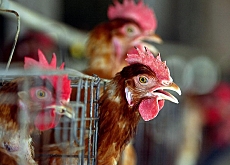Countries seek to bypass Tamiflu patent

India and two other countries have indicated they may authorise generic production of flu drug Tamiflu without the prior approval of the Swiss producer, Roche.
It comes amid growing fears of a bird-flu pandemic. Under World Trade Organisation rules, countries facing a public health emergency can issue licences to legally manufacture generic versions of patented drugs.
The Indian government has given the go-ahead for production of a generic version of the antiviral drug, the Times of India reported on Wednesday. Thailand and Argentina are said to be considering a similar move.
The Indian newspaper report said firms in the country could start production straight away without Roche’s approval because the Basel-based pharmaceutical company had not applied for a patent in India.
The announcement prompted a swift and unambiguous response from Roche. “We have applied for a patent,” a spokeswoman said.
The World Health Organization has warned of a possible pandemic of the fatal H5N1 bird-flu virus. Since the disease first emerged in 2003, occasional outbreaks among humans have killed more than 60 people in southeast Asia.
Stockpiling
Tamiflu is considered one of the few drugs likely to be effective against the spread of the disease among humans. Since the latest outbreak, countries around the world have rushed to stockpile the antiviral drug prompting concerns that Roche will be unable to keep up with demand.
Roche said last week it was ready to share production of Tamiflu with rival firms but ruled out relinquishing the patent for the drug.
The Indian generic drugs maker, Cipla, was among the first companies to announce it wanted permission to produce a version of Tamiflu. According to the Times of India, both Cipla and another manufacturer, Ranbaxy, wrote to Roche requesting permission to make the drug under a licence agreement but received no response.
“For us, the problem is not the patent but the capacity for Tamiflu production,” the Roche spokeswoman said in comments reported on Thursday. “We have ten years’ experience and we would like to be consulted as this is a long, complex process.”
swissinfo with agencies
Since the end of 2003, the H5N1 bird flu virus has caused at least 60 deaths in Asia, mostly people who have come into contact with birds.
The World Health Organization in Geneva estimates that a pandemic could cause 2-7.4 million deaths.
Vaccines effective against a virus pandemic are not yet available. Antiviral drugs, such as Tamiflu, are the only medical defence.

In compliance with the JTI standards
More: SWI swissinfo.ch certified by the Journalism Trust Initiative










You can find an overview of ongoing debates with our journalists here . Please join us!
If you want to start a conversation about a topic raised in this article or want to report factual errors, email us at english@swissinfo.ch.